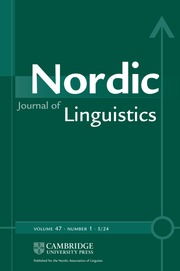No CrossRef data available.
Article contents
Grammar and the Intersubjectivity of Language. Focus on Epistemic Verbs
Published online by Cambridge University Press: 22 December 2008
Abstract
This paper argues that Jürgen Habermas' theory of universal pragmatics is valuable for semantic and text-linguistic theory. Habermas' distinctions between communicative action (Kommunikatives Handeln) and discourse (Diskurs; debate on the validity of statements) are reflected in linguistic structure, as is his distinction between the four dimensions involved in every speech, act: comprehensibility, truth, sincerity, and correctness. The primary question is: Given that Habermas' distinctions are universal, what means of signalling them do natural languages contain? The present article limits itself to contrastive focus and epistemic verbs. The application of contrastive focus, to epistemic verbs enables speakers to mark the distinction between communicative action and discourse (the level of debate) and to clarify the dimension, under debate: comprehensibility, truth, sincerity, or correctness.
- Type
- Research Article
- Information
- Copyright
- Copyright © Cambridge University Press 1981


